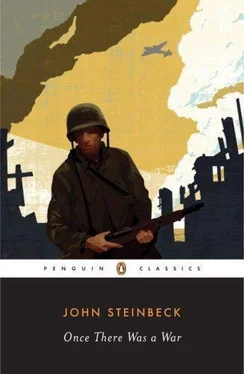John Steinbeck - Once there was a war
Здесь есть возможность читать онлайн «John Steinbeck - Once there was a war» весь текст электронной книги совершенно бесплатно (целиком полную версию без сокращений). В некоторых случаях можно слушать аудио, скачать через торрент в формате fb2 и присутствует краткое содержание. Город: New York, Год выпуска: 1960, Издательство: Bantam Books, Жанр: Классическая проза, на английском языке. Описание произведения, (предисловие) а так же отзывы посетителей доступны на портале библиотеки ЛибКат.
- Название:Once there was a war
- Автор:
- Издательство:Bantam Books
- Жанр:
- Год:1960
- Город:New York
- ISBN:нет данных
- Рейтинг книги:3 / 5. Голосов: 1
-
Избранное:Добавить в избранное
- Отзывы:
-
Ваша оценка:
- 60
- 1
- 2
- 3
- 4
- 5
Once there was a war: краткое содержание, описание и аннотация
Предлагаем к чтению аннотацию, описание, краткое содержание или предисловие (зависит от того, что написал сам автор книги «Once there was a war»). Если вы не нашли необходимую информацию о книге — напишите в комментариях, мы постараемся отыскать её.
Once there was a war — читать онлайн бесплатно полную книгу (весь текст) целиком
Ниже представлен текст книги, разбитый по страницам. Система сохранения места последней прочитанной страницы, позволяет с удобством читать онлайн бесплатно книгу «Once there was a war», без необходимости каждый раз заново искать на чём Вы остановились. Поставьте закладку, и сможете в любой момент перейти на страницу, на которой закончили чтение.
Интервал:
Закладка:
“Take off your dog tags and put them up here,” said the sergeant. He began to make notes on a pad from the dog tags. “Put everything in your pockets in this box.” He shoved a cigar box to the edge of his desk.
“But this here’s my stuff,” the little man protested.
“You’ll get a receipt. Put it up and roll up your sleeves.”
The two men who had been with the little fat man were silent and watchful. “Who was driving the truck?” the desk sergeant asked.
“A fellow named Willie. He jumped out and ran away.”
The sergeant turned to the other two. “Who was driving the truck?” he asked them.
They both nodded their heads toward the little fat man and neither one of them spoke. “You bastards,” the little fat man said quietly. “Oh, you dirty bastards.”
“Roll up your sleeves,” the desk sergeant said, and then: “Good God, four wrist watches. Say, this one is a GI watch. That’s government property. Where did you get it?”
“I lent a fellow money for it. He’s going to get it back when he pays me.”
“Put your wallet up here.”
The little fat man brought out a wallet of red morocco leather and hesitantly put it up. “I want a receipt for this. This is my savings.”
The desk sergeant shook out the wallet. “God Almighty,” he said, and he began to count the mounds of bills and he made notes on his pad. “Ten thousand Algerian francs and three thousand dollars, American,” he said. “You really are packing the stuff away, aren’t you, buddy?”
“That’s my life savings,” the little fat man said plaintively. “I want a receipt for that, that’s my money.”
The lieutenant behind the desk came to life. “Lock them up separately,” he said. “I’ll talk to them. Sergeant, you send a detail out for that truck and tell them to search the place all around there. Tell them to look out for watches, Elgins, GI watches. It will be a case about this size. It would have a thousand in it if they are all there. The Arabs are paying forty bucks for them. Okay, lock these men up.”
“A guy named Willie,” the fat man complained, “a guy named Willie just asked us to come for a ride.” He looked at the other two and his soft face was venomous. “Oh, you dirty bastards,” he said.
OVER THE HILL
A NORTH AFRICAN POST ( Via London ), September 1, 1943 —
Sligo and the kid took their forty-eight hour pass listlessly. The bars close in Algeria at eight o’clock but they got pretty drunk on wine before that happened and they took a bottle with them and lay down on the beach. The night was warm and after the two had finished the second bottle of wine they took off their clothes and waded out into the quiet water and then squatted down and sat there with only their heads out. “Pretty nice, eh, kid?” said Sligo. “There’s guys used to pay heavy dough for stuff just like this and we get it for nothing.”
“I’d rather be home on Tenth Avnoo,” said the kid. “I’d rather be there than any place. I’d like to see my old lady. I’d like to see the World Series this year.”
“You’d like maybe a clip in the kisser,” said Sligo.
“I’d like to go into the Greek’s and get me a double chocolate malted with six eggs in it,” said the kid. He bobbed up to keep a little wavelet out of his mouth. “This place is lonely. I like Coney.”
“Too full of people,” said Sligo.
“This place is lonely,” said the kid.
“Talking about the Series, I’d like to do that myself,” said Sligo. “It’s just times like this a fella gets kind of tempted to go over the hill.”
“S’posen you went over the hill — where the hell would you go? There ain’t no place to go.”
“I’d go home,” said Sligo. “I’d go to the Series. I’d be first in the bleachers, like I was in ’forty.”
“You couldn’t get home,” the kid said; “there ain’t no way to get home.”
The wine was warming Sligo and the water was good. “I got dough says I can get home,” he said carelessly.
“How much dough?”
“Twenty bucks.”
“You can’t do it,” said the kid.
“You want to take the bet?”
“Sure, I’ll take it. When you going to pay?”
“I ain’t going to pay, you’re going to pay. Let’s go up on the beach and knock off a little sleep.”…
At the piers the ships lay. They had brought landing craft and tanks and troops and now they lay, taking in the scrap, the broken equipment from the North African battlefields which would go to the blast furnaces to make more tanks and landing craft. Sligo and the kid sat on a pile of C-ration boxes and watched the ships. Down the hill came a detail with a hundred Italian prisoners to be shipped to New York. Some of the prisoners were ragged and some were dressed in American khaki because they had been too ragged in the wrong places. None of the prisoners seemed to be unhappy about going to America. They marched down to a gangplank and then stood in a crowd, awaiting orders to get aboard.
“Look at them,” said the kid, “they get to go home and we got to stay. What you doing, Sligo? What you rubbing oil all over your pants for?”
“Twenty bucks,” said Sligo, “and I’ll find you and collect, too.” He stood off and took off his overseas cap and tossed it to the kid. “Here’s a present, kid.”
“What you going to do, Sligo?”
“Don’t you come follow me, you’re too dumb. Twenty bucks, and don’t you forget it. So long, see you on Tenth Avnoo.”
The kid watched him go, uncomprehending. Sligo, with dirty pants and a ripped shirt, moved gradually over, near to the prisoners, and then imperceptibly he edged in among them and stood bareheaded, looking back at the kid.
An order was called down to the guards, and they herded the prisoners toward the gangplank. Sligo’s voice came plaintively. “I’m not supposed to be here. Hey, don’t put me on dis ship.”
“Shut up, wop,” a guard growled at him. “I don’t care if you did live sixteen years in Brooklyn. Git up that plank.” He pushed the reluctant Sligo up the gangplank.
Back on the pile of boxes the kid watched with admiration. He saw Sligo get to the rail. He saw Sligo still protesting and righting to get back to the pier. He heard him shrieking, “Hey, I’m Americano, Americano soldier. You canna poot me here.”
The kid saw Sligo struggling and then he saw the final triumph. He saw Sligo take a sock at a guard and he saw the guard’s club rise and come down on Sligo’s head. His friend collapsed and was carried out of sight on board the ship. “The son of a gun,” the kid murmured to himself. “The smart son of a gun. They can’t do nothing at all to him and he got witnesses. Well, the smart son of a gun. My God, it’s worth twenty bucks.”
The kid sat on the boxes for a long time. He didn’t leave his place till the ship cast off and the tugs pulled her clear of the submarine nets. The kid saw the ship join the group and he saw the destroyers move up and take the convoy under protection. The kid walked dejectedly up to the town. He bought a bottle of Algerian wine and headed back toward the beach to sleep his forty-eight.
THE SHORT SNORTER WAR MENACE
SOMEWHERE IN AFRICA ( Via London ), September 2, 1943 —
The growth of the Short Snorters is one of the greatest single menaces to come out of the war so far. The idea started as a kind of joke in a time when very few people flew over an ocean in an airplane. It became the custom then for the crew of the airplane to sign their names on a one-dollar bill which made the new ocean flyer a Short Snorter. He was supposed to keep this bill always with him. If at any time he were asked if he were a Short Snorter and he did not have his signed bill with him he was forced to pay a dollar to each member present at the time when the question was asked. It was good fun and a kind of general joke and also a means of getting someone to pay for the drinks.
Читать дальшеИнтервал:
Закладка:
Похожие книги на «Once there was a war»
Представляем Вашему вниманию похожие книги на «Once there was a war» списком для выбора. Мы отобрали схожую по названию и смыслу литературу в надежде предоставить читателям больше вариантов отыскать новые, интересные, ещё непрочитанные произведения.
Обсуждение, отзывы о книге «Once there was a war» и просто собственные мнения читателей. Оставьте ваши комментарии, напишите, что Вы думаете о произведении, его смысле или главных героях. Укажите что конкретно понравилось, а что нет, и почему Вы так считаете.









